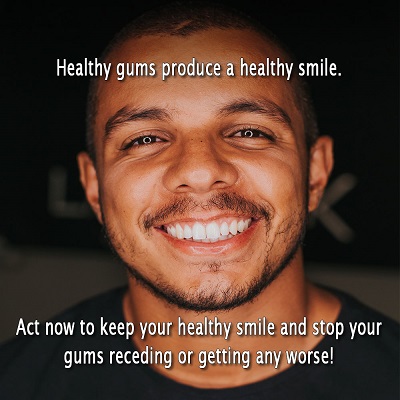 Receding gums or gingival recession is a gradual deterioration of your gum tissue, exposing more of your teeth and their roots. Because it is pulled back, you can see pockets form between your gums and teeth and this will allow bacteria to more easily grow and multiply. If you ignore it, problems will arise such as tooth decay, loss of tissue and bone, and tooth loss.
Receding gums or gingival recession is a gradual deterioration of your gum tissue, exposing more of your teeth and their roots. Because it is pulled back, you can see pockets form between your gums and teeth and this will allow bacteria to more easily grow and multiply. If you ignore it, problems will arise such as tooth decay, loss of tissue and bone, and tooth loss.
They say that in every problem, there is a solution, but to know the right solution, you have to know first why your gums recede. These are:
- Aging or family history that makes you prone to gum recession.
- Brushing your teeth too hard and using a hard-bristled toothbrush so it slowly erodes the soft tissue of your gums.
- Diabetes.
- Gum diseases such as gingivitis and periodontitis caused by a lack of good oral hygiene. The bacteria under your gum line will accumulate and cause swelling and will make your gums recede away from the plaque.
- Hormonal issues such as during menopause or pregnancy.
- Involuntary and consistent grinding of teeth and teeth clenching while sleeping, called bruxism.
- Injury to your gum tissue because of a dental procedure, fall or accident, engaging in contact sports, or from wearing partial or ill-fitted dentures.
- The plaque from your teeth cascaded and infected your gum line. This in turn will infect the soft tissue, cause it to swell and pull away from your teeth.
Signs You Have Receding Gums
To confirm if you have receding gums and prevent them from getting worse, you need to consult your trusted dentist as soon as possible. However, here are the signs you can look for yourself.
- Your gums are visibly swollen and inflamed, and some teeth may feel loose.
- As the gums recede, more of the tooth is exposed, so your teeth look longer than when you were younger. Hence the term, ‘long in the tooth.’
- You constantly have bad breath.
- Your teeth become sensitive to hot or cold food and drinks.
Ways to Stop Gum Recession
Aside from family history or genetics, the other causes are thankfully remediable and treatable. One important thing to do is floss! Flossing is a great first step to prevent bacterial problems in the gums and maintain healthy teeth and gums.
There are medical, cosmetic, and natural remedies you can undertake to prevent receding gums from getting worse.
- Medical treatments and surgical techniques can add tissue to make your gums look healthier and to protect the exposed root from decaying. Your dentist or periodontist will determine which is the best option for you or if you are a candidate for one of these treatments. They are administered painlessly with local anesthesia because some gums will be lifted to clean the root of your tooth. Then they will be stretched and repositioned over the exposed root.
- Cosmetic treatments like composite restoration, using pink porcelain, orthodontics, and use of removable gum veneers. Your dentist will cover the exposed root with a bonding compound, hide discoloration, close the gaps in between your teeth, reposition your teeth with braces, or will apply gum-colored veneers.
- Your dentist can give you a custom-made mouth guard if the recession is caused by teeth grinding and clenching of jaws. This is to balance the pressure and to protect your teeth. You may also be referred to a temporomandibular joint (TMJ) specialist that has more expertise in preventing bruxism if it’s difficult to control. Mouth guards can also be used if you play contact sports to protect against injury to your gums and teeth.
- Deep cleaning if you have excessive plaque formation below your gum line to remove the bacteria and stop gum recession. The dentist will use a scaling and planing tool for going below the gum’s surface to scrape the plaque from your teeth.
- Replacing your ill-fitted dentures. Since our gums and jaw change their shape while aging, your dentist should replace or adjust them to avoid continuous rubbing on your gums.
- Have a regular dental check-up every six months. Early detection and treatment can prevent gum recession from progressing.
- Drink more water to stay hydrated and prevent plaque build-up.
- Practice good oral hygiene by brushing your teeth gently and thoroughly. Do it twice or thrice daily with a soft-bristled toothbrush, an electric one if possible, and in a circular motion. Floss once a day. Use a prescription mouthwash afterward.
- Use a toothpaste that does not contain a teeth whitener. Whitening toothpaste contains gum irritants like hydrogen peroxide that if used daily may cause more gum recession. You can also choose a toothpaste made to diminish plaque and promote healthy gums.
- Maintain a balanced diet.
- Natural options include using turmeric gel to prevent plaque formation, green tea that helps get rid of gum diseases, and eucalyptus extract chewing gum that protects oral health and stops gums from receding.
Keep in touch with your dentist regularly to have personalized advice and treatment about your teeth and gum condition. Remember, healthy gums produce a healthy smile. Act now to stop your receding gums from getting any worse.






